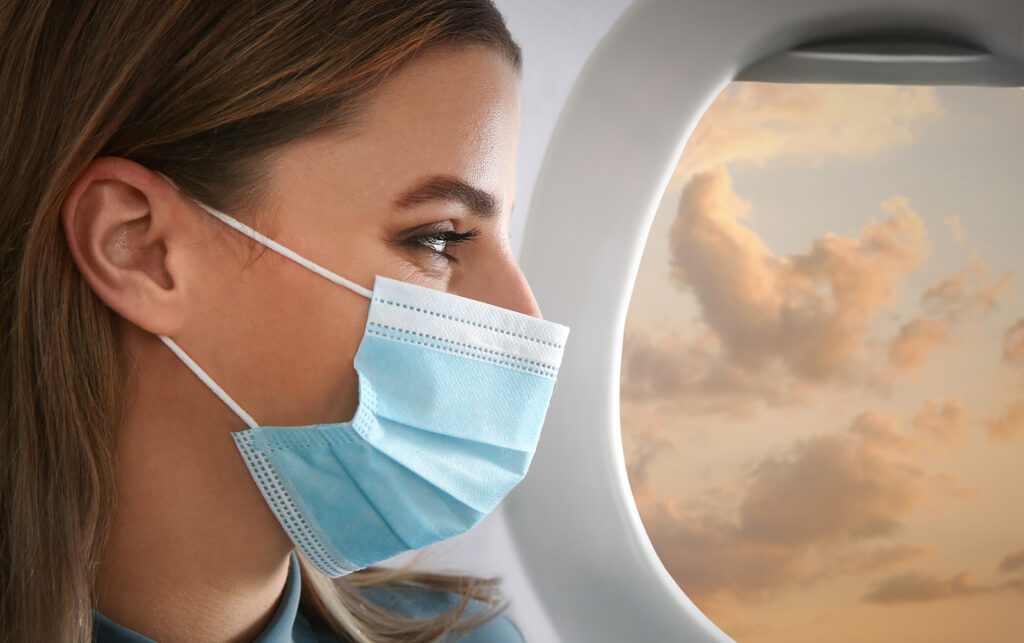
Airlines are flying to domestic locations and we’ve been housebound for too long. Most of us would go just about anywhere just to go. But some people may still be concerned about getting on a flight with social distancing orders still in place. Airlines and airports around the world are doing everything they can to instill confidence that it is safe to fly again, despite the pandemic. (Boeing, 2020)
The Centers for Disease Control and Prevention guidelines they say that people may be less likely to contract a virus on a flight because of how the air is circulated and filtered on airplanes, but they may be more likely to get sick from being in close contact with others on airport security lines or from coming in contact with frequently touched surfaces. (CDC Guidelines)
Know Restrictions – (Domestic/International)
Keeping abreast of ever-changing quarantine rules, travel bans, advisories, etc. is mission-critical for travelers in 2020. Every state is on its reopening schedule, and rules and regulations are changing rapidly, so it’s important to keep up to date with local guidelines before you travel.
What Should I Expect at The Airport and On The Plane?
For those who haven’t flown since early March, airports are practically unrecognizable. Each airport and airline has varying protocols in place to combat the spread of coronavirus. But depending on your location, you can expect ubiquitous hand sanitizer locations, UV lights directed at self-service kiosks, and a sea of face masks. Be sure to bring a mask, even if your particular flight won’t require it — some airports will require masks to get through the door. (Fox Business, 2020)
What about the expectations from TSA (Transport Security Staff)
As per their latest press release here is what you could expect from the TSA at your airport –
- TSA officers will wear gloves and masks, and change gloves after each pat-down.
- Passengers should wear facial protection and practice social distancing in the checkpoint line
- Passengers may be asked to remove their mask to verify ID (or if the mask trips an alarm for some reason)
- Scan your boarding pass (don’t hand it to the TSA officer), then display it to TSA for visual inspection
- If your bag triggers an alarm, you may be directed out of line to dispose of/separate culprit items and return through the line (eliminating a TSA officer’s search of your bags)
How Clean is the Plane?
Almost all major airlines are disinfecting planes between flights, giving extra attention to high-touch surfaces and bathrooms. Many airplanes also use HEPA filters, which completely refresh the cabin air throughout the flight and work to filter out over 99 percent of airborne viruses, bacteria, and other contagions. Few airlines are also offering disinfectant wipes or hand sanitizer to passengers, though we still recommend carrying your own just to be safe.
Consider Safety Protocols and Enforcement
There is mounting evidence that wearing a face mask is key to preventing the spread of COVID-19, making this one of the easiest ways to help mitigate risk while traveling. More and more airlines are starting to require face coverings, including Delta, United, American, JetBlue, and Southwest — sometimes with hefty consequences, like being banned from the airline if you don’t comply. (Millionmiles, 2020)
Expect Changes in Flight Schedules
Due to the massive drop in demand, airlines have made significant cuts to their flight schedules.
Can You Social Distance on an Airplane?
Airlines are doing their best to help you physically distance without filing Chapter 11. As stated in the list above, many are blocking out middle seats from purchase, to ensure you’re not rubbing shoulders with anyone (you can still request to sit with family members, if you like).
Are Airlines Serving Meals?
Many airlines have shifted their meal services to pre-packaged foods with disposable flatware. Some airlines are even encouraging passengers to bring their food for the flights (Especially with kids onboarding).
How can I Help Prevent the Spread of COVID After I Land?
Don’t overthink it. The number one thing is to recognize your responsibility. Leave the airport while touching as little as possible. It’s the little things that can help.
At last, we can say if you are considering getting engage in air travel, some common-sense decisions will lower the risk of contracting or distributing the novel coronavirus to others. Please feel free to let us know if you’ve any questions and we would be delighted to help further.
Work Cited
“Considerations for Travelers-Coronavirus in the US.” 30 July 2020. https://www.cdc.gov/coronavirus/2019-ncov/travelers/travel-in-the-us.html
Settembre, Jeanette. “With Coronavirus Restrictions Easing, Is It Safe to Fly Now?” Fox Business. Fox Business, 09 June 2020. https://www.foxbusiness.com/lifestyle/is-it-safe-to-fly-again
Hostetler, Joseph. “Is It Safe to Fly Again? Your Coronavirus Questions Answered.” Million Mile Secrets. Million Mile Secrets, 15 July 2020. https://millionmilesecrets.com/guides/is-it-safe-to-fly-coronavirus/
“Travel with Confidence.” Is It Safe To Fly? Healthy Air Travel Information from Boeing. 30 July 2020. https://www.boeing.com/confident-travel/?gclid=CjwKCAjwmf_4BRABEiwAGhDfSVEn88o0p9e8Mcs0X6YGIM7Lmiri-2qi66kU19alWpfeWlSZxy9-qRoCYC0QAvD_BwE





